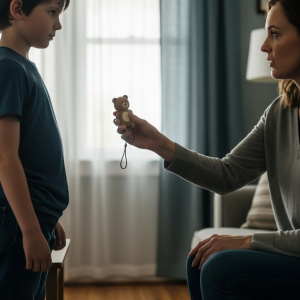The pain began behind Alex’s eyes. It was a dull, persistent pressure, a constant companion that had taken up residence in his skull months ago. With it came the insomnia, long nights spent staring at the ceiling, his body exhausted but his mind refusing to switch off. The world had become a blurry, fatiguing landscape.
His wife, Catherine, was a portrait of patient, loving concern. An acclaimed art critic with a poet’s soul, she moved through their minimalist, modern home with a serene grace that only highlighted his own growing agitation.
“You’re pushing yourself too hard at the firm, my love,” she would say, her voice a soft melody of sympathy. “This level of stress… it’s manifesting physically. I really think you should talk to Dr. Miller about your anxiety. Maybe some medication would help you rest.”
She was the first to give his condition a name: depression. To her, it was an open-and-shut case. He was a successful architect at a high-pressure firm. He was overworked. He was burning out. Any suggestion he made about a physical cause was gently, lovingly dismissed.
Then came the hum. It was a high-frequency, barely audible whine, a needle of sound that seemed to pierce through the background noise of their quiet life. He only heard it in the kitchen, specifically near the state-of-the-art water filtration system she’d insisted they install. When he got close, the pressure in his head would intensify, the hum and the pain vibrating in cruel harmony.
“I don’t hear anything, darling,” she’d say, tilting her head with a look of profound pity. “You’re becoming sensitive to everything. It’s a classic symptom of exhaustion. You’re imagining it.”
Gaslighting. He knew the term. But coming from Catherine, the woman who curated their life with such love and precision, it felt impossible. He was the one who was unwell. He was the one who was breaking.
He couldn’t take it anymore. The hum was real. It was a fixed, physical thing, and it was driving him insane. While Catherine was out at a gallery opening, he made a decision. He wasn’t going to call a doctor. He was going to call a plumber.
An hour later, a nondescript white van pulled into the driveway. A man in his late fifties with a weathered face and calloused hands introduced himself as Frank. He had a quiet, competent air about him. Alex explained the problem, feeling foolish as he described the “high-pitched noise from the pipes.”
Frank listened without judgment, simply nodding. “Alright, sir. Let’s take a look.”
He followed Alex to the kitchen and listened intently by the sink. “I hear it,” he said, his voice a low rumble. “Not pipes. Electrical interference, maybe.” He opened the cabinet beneath the sink and began to inspect the complex network of tubes and wires for the filtration system. He unlatched the main control panel.
And then he stopped. He went completely still, his back rigid. He stared into the guts of the machine for a long, silent moment.
Slowly, he stood up and turned to face Alex. His folksy handyman demeanor had vanished, replaced by an unnerving seriousness. His eyes, which had been placid and professional, were now sharp and intensely focused.
He gestured for Alex to step away from the kitchen, into the living room. He spoke in a low, urgent voice, a voice that carried the weight of grim authority.
“Sir,” he began, his gaze unwavering, “I need you to listen to me very carefully. What’s in there is not part of any water filtration system I’ve ever seen. And I’ve seen plenty.”
He took a deep breath. “Before I started this business, I spent twenty years in the Army. Signals Intelligence. What’s wired into your water filter is a high-frequency sonic emitter. It’s a non-standard acoustic weapon. We used similar technology in interrogation training. It’s designed to bypass the ear and directly stimulate the auditory cortex. It causes disorientation, intense headaches, sleep deprivation… It’s designed for psychological torture. Someone is trying to harm you, sir. Deliberately and cruelly.”
Alex’s world did not crumble. It detonated. The hum, the headaches, the insomnia, Catherine’s gentle insistence on “depression,” her pitying smiles, her suggestions of medication—it all coalesced into a single, monstrous picture of absolute betrayal.
He wasn’t sick. He was being attacked. In his own home.
The blood drained from his face. He leaned against a wall, his legs threatening to buckle. Frank’s voice seemed to come from a great distance. “Sir? Are you alright?”
“My wife,” Alex whispered, the words catching in his throat. “She said… she said I was imagining it.”
A look of profound understanding and sorrow crossed Frank’s face. He knew exactly what this meant. “I’ve disconnected the power source,” he said quietly. “It’s inert for now. But if there’s one… there might be others.”

After Frank left, refusing payment and only leaving a private cell number on a slip of paper, Alex was left alone in the silent house. The hum was gone. For the first time in months, a pocket of quiet clarity opened in his mind. And with that clarity came a cold, terrifying purpose.
He started in the bedroom. He ran his hands along the underside of their minimalist platform bed. On his side, tucked deep against the central support beam and held in place by industrial adhesive, his fingers brushed against a small, metallic box. It was another one. Identical to the first.
His heart hammered against his ribs. He felt a wave of nausea. He had been sleeping inches away from a device designed to break his mind.
He stumbled out to the garage, his movements frantic. He tore at the headrest of the driver’s seat in his car, pulling the fabric away from the foam. And there it was. A third device, smaller this time, wired directly into the car’s electrical system.
The truth was absolute and inescapable. He was being besieged, 24/7. At home, in his bed, on his way to work. There was no escape. This wasn’t just an attack. It was a siege. And the person laying siege to his sanity was the woman he loved.
Huddled in the silence of his study, the disconnected devices laid out on his desk like venomous insects, Alex forced his ravaged mind to work. He began to sift through the wreckage of the past two years, looking at every memory, every conversation, through the horrifying new lens of the truth.
The foreshadowing had been there all along, a trail of clues he had been too sick and too trusting to see.
Catherine, the art critic who claimed to be “utterly hopeless with technology,” had once made a startlingly astute comment about the resonant frequencies of their home theater system. Another time, she had correctly diagnosed a problem with their smart home wiring that had stumped a professional technician. He had thought it was a fluke, a lucky guess.
He thought about his business trips. The crushing symptoms would always seem to lift by the second or third day he was away. He would start to feel clear-headed, energetic. The insomnia would recede. He had always credited the change of scenery. Now he knew the truth: those trips had been his only “safe zones,” the only times he was out of range.
Then came the most chilling memory of all. It surfaced from the fog of his memory, sharp and terrifyingly specific. It was just over two years ago. Two years and one month, to be exact. Catherine had become obsessed with their financial planning.
“We have to be responsible, Alex,” she had insisted. “What if something happened to you? The firm’s policy isn’t enough.” She had pushed, cajoled, and finally convinced him to take out a massive private life insurance policy. He remembered a specific detail from the paperwork, a clause she had pointed out to him as “standard procedure.” After a period of 24 months, the policy would pay out in full, even in the event of a suicide.
The 24-month period had expired last month.
He wasn’t just being attacked. He was being primed. She was methodically, patiently breaking him down, preparing to stage the final act of a depressed man who had tragically decided to end his own life.
The next morning, Alex made two calls. The first was to Frank, who answered immediately. Alex explained what he had found. There was a pause on the other end of the line, then a low whistle. “Son, you’re in deeper than I thought. What do you need?”
“I need proof,” Alex said, his voice cold and hard. “And I need a witness.”
His second call was to his office. He told them he had a severe case of the flu and would be working from home for the rest of the week.
That afternoon, while Catherine was at the museum, Frank returned. He wasn’t dressed as a handyman. He was dressed in discreet, professional attire. He brought with him a bag of tools Alex had never seen before. Working with a quiet, military efficiency, they installed a series of tiny, motion-activated security cameras throughout the house—in the kitchen, the bedroom, the garage. They were nearly invisible, hidden in smoke detectors and power outlets.
“They’re all linked to a secure server,” Frank explained, showing Alex the app on his phone. “It’ll record everything. You just have to wait. She’ll have to check on her hardware eventually.”
Waiting was the hardest part. He had to pretend. He had to play the part of the sick, broken husband, all while knowing that the woman who brought him his meals, who touched his face with such tenderness, was actively trying to murder him. It was a performance for his life.
He didn’t have to wait long. On the third night, it happened. He was pretending to be asleep in bed when he received a motion alert on his phone. He watched, his body rigid with a mixture of terror and vindication, the live feed from the camera in the kitchen.
The footage was crystal clear. It showed Catherine, her face illuminated by a small flashlight, opening the panel beneath the sink. She thought he had reconnected the device Frank had disabled. She pulled out a small multi-tool and began to delicately adjust a dial on the emitter. She was recalibrating it. Tuning the weapon that was meant to destroy him.
He saved the video file. He had her.
The next morning, Alex walked into the local police precinct. He was calm, composed, and he carried a tablet containing the video file, photos of the devices, and Frank’s sworn statement and credentials.
He sat down with two detectives, a man and a woman, who listened with expressions that shifted from weary professionalism to rapt, horrified attention. They watched the video. They looked at Frank’s analysis of the sonic emitters.
“She has a degree in electrical engineering from Caltech,” Alex told them, a fact he had discovered after a frantic, late-night search of university alumni records. “She’s never mentioned it. Not once in the ten years we’ve been together.” He also handed them a copy of the multi-million dollar life insurance policy.
The arrest was quiet and surgical. They waited until Catherine was at her favorite cafe. The two detectives approached her table. When they told her she was being arrested for attempted murder, her mask of serene sophistication finally shattered. For a single, fleeting moment, her face was a canvas of pure, venomous rage, the face of a predator whose prey had just turned and bitten back.
The investigation was a landslide. They uncovered her hidden past, her sealed academic records. They found the schematics for the devices on a hidden partition of her laptop. The motive—the life insurance policy—was clear and undeniable. Catherine, the celebrated art critic, was unmasked as a cold, calculating monster.
Her psychological destruction was as complete as the one she had planned for Alex. Her brilliant, patient, meticulously crafted plan had been undone by a barely audible noise and the one-in-a-million chance that her husband would call a former signals intelligence expert to fix a “noisy pipe.”
The night Catherine was arrested, Alex had the house to himself. Frank had come by earlier and done a complete sweep, removing the devices and the cameras. For the first time in almost two years, the house was truly silent.
That night, Alex slept. He slept for ten solid, uninterrupted hours. It was a deep, dreamless, and profound sleep. He woke up the next morning feeling a clarity he had forgotten was possible. The pressure behind his eyes was gone. The fog in his brain had lifted. He felt… reborn.
He sold the house, unwilling to spend another night in the place that had been his prison. He moved into a new apartment downtown, a space filled with light and the sounds of the city. He took a long leave of absence from work, giving himself time to heal, to process the sheer scale of the betrayal.
The ordeal had taught him a terrible but invaluable lesson: to trust his own instincts, to listen to the small, insistent warnings of his own body and mind. He started a blog, sharing his story anonymously, raising awareness about the insidious, invisible forms that domestic abuse can take. He found a community of survivors, people who had also been told they were “imagining it.”
One morning, he woke up to the sound of birds singing outside his window. He lay there for a long time, just listening. There was no hum. There was no pressure. There was only the sound of a new day, a day that was entirely his. And for the first time in a very long time, he felt completely and utterly safe.




